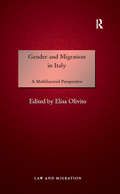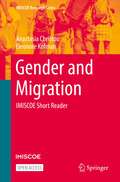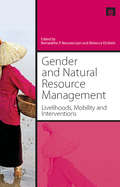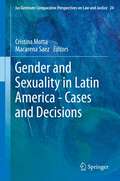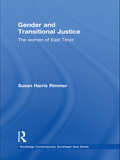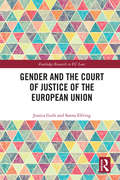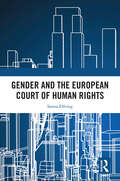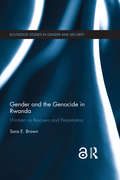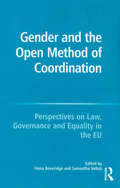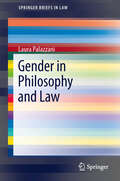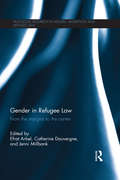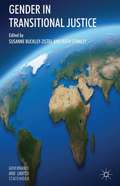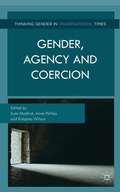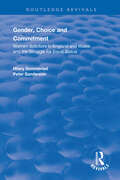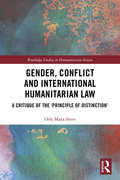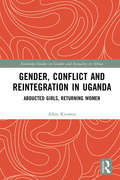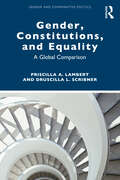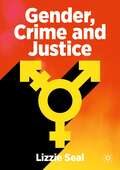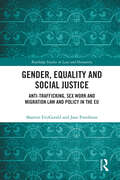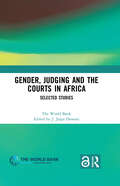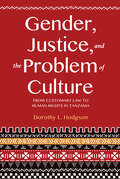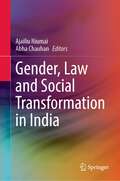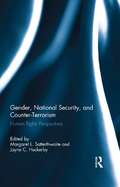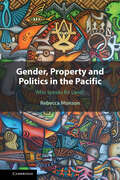- Table View
- List View
Gender and Migration in Italy: A Multilayered Perspective (Law and Migration)
by Elisa OlivitoRecent migratory flows to Europe have brought about considerable changes in many countries. Italy in particular offers a unique point of view, since it is possible to observe not only the way migration has changed specific features of the country, but also how it is intertwined with gender relations. Considering both the type of migration that has affected Italy and the consequent measures adopted by the Government, a variety of distinctive elements may be seen. By providing a broad and more complete picture of the Italian perspective on gender and migration, this book makes a valuable contribution to the wider debate. The contributions consider the problematic linkage between gender and migration, as well as analyse particular aspects including Italian colonial past, domestic work, self-determination, access to social services, second-generation migrant women, family law, multiculturalism and religious symbols. Taking an empirical and theoretical approach, the volume underlines both the multifaceted problems affecting migrant women in Italy and the way in which questions raised in other countries are introduced and redefined by Italian scholarship. The book presents a valuable resource for researchers, academics and policy-makers working in the areas of migration and gender studies.
Gender and Migration: IMISCOE Short Reader (IMISCOE Research Series)
by Eleonore Kofman Anastasia ChristouThis open access short reader offers a critical review of the debates on the transformation of migration and gendered mobilities primarily in Europe, though also engaging in wider theoretical insights. Building on empirical case studies and grounded in an analytical framework that incorporates both men and women, masculinities, sexualities and wider intersectional insights, this reader provides an accessible overview of conceptual developments and methodological shifts and their implications for a gendered understanding of migration in the past 30 years. It explores different and emerging approaches in major areas, such as: gendered labour markets across diverse sectors beyond domestic and care work to include skilled sectors of social reproduction; the significance of families in migration and transnational families; displacement, asylum and refugees and the incorporation of gender and sexuality in asylum determination; academic critiques and gendered discourses concerning integration often with the focus on Muslim women. The reader concludes with considerations of the potential impact of three notable developments on gendered migrations and mobilities: Black Lives Matter, Brexit and COVID-19. As such, it is a valuable resource for students, academics, policy makers, and practitioners.
Gender and Natural Resource Management: Livelihoods, Mobility and Interventions
by Rebecca Elmhirst Bernadette P. ResurreccionThis book is about the gender dimensions of natural resource exploitation and management, with a focus on Asia. It explores the uneasy negotiations between theory, policy and practice that are often evident within the realm of gender, environment and natural resource management, especially where gender is understood as a political, negotiated and contested element of social relationships. It offers a critical feminist perspective on gender relations and natural resource management in the context of contemporary policy concerns: decentralized governance, the elimination of poverty and themainstreaming of gender. Through a combination of strong conceptual argument and empirical material from a variety of political economic and ecological contexts (including Cambodia, China, Indonesia, Malaysia, Nepal, Thailand and Vietnam), the book examines gender-environment linkages within shifting configurations of resource access and control. The book will serve as a core resource for students of gender studies and natural resource management, and as supplementary reading for a wide range of disciplines including geography, environmental studies, sociology and development. It also provides a stimulating collection of ideas for professionals looking to incorporate gender issues within their practice in sustainable development. Published with IDRC.
Gender and Sexuality in Latin America - Cases and Decisions
by Cristina Motta Macarena SaezTranslated and updated from the seminal Spanish text on legal decisions affecting gender and sexuality in Latin America, this English edition is the only law text to focus specifically on the rights of lesbians, gays, bisexuals and the transgender population in addition to women's rights more broadly. The volume provides close analysis of some of the most important decisions made by Latin American national courts, as well as those made by international legal bodies, that affect the rights and interests of these groups. Specially selected for their depth of argument and value as exemplars, the studies of good legal practice chart the path of the region's normative values of justice as they have evolved away from a partial, and patriarchal, exercise of the law. They show how cases with vastly differing contexts such as, property rights and domestic violence have resulted in a mixed body of Latin American law. Some decisions are protective of women's and minority rights. Some assess the wider social impacts of case law in which recognition of the discrete legal identities within households challenges established precepts, including religious ones. Other cases have been chosen as cautionary examples of bad decision-making and for the poverty of their legal debate. Updated to include the latest relevant jurisprudence from across the continent, this book is an informed, cohesive and comprehensive guide to understanding women's and gender-based rights in Latin America.
Gender and Transitional Justice: The Women of East Timor (Routledge Contemporary Southeast Asia Series)
by Susan Harris RimmerGender and Transitional Justice provides the first comprehensive feminist analysis of the role of international law in formal transitional justice mechanisms. Using East Timor as a case study, it offers reflections on transitional justice administered by a UN transitional administration. Often presented as a UN success story, the author demonstrates that, in spite of women and children’s rights programmes of the UN and other donors, justice for women has deteriorated in post-conflict Timor, and violence has remained a constant in their lives. This book provides a gendered analysis of transitional justice as a discipline. It is also one of the first studies to offer a comprehensive case study of how women engaged in the whole range of transitional mechanisms in a post-conflict state, i.e. domestic trials, internationalised trials and truth commissions. The book reveals the political dynamics in a post-conflict setting around gender and questions of justice, and reframes of the meanings of success and failure of international interventions in the light of them.
Gender and the Court of Justice of the European Union (Routledge Research in EU Law)
by Jessica Guth Sanna ElfvingOffering an alternative exploration of the Court of Justice of the European Union (CJEU) and its work, this book aims to start a conversation between legal, political and gendered examinations of the Court of Justice and some of the substantive areas of law it is concerned with. In doing so, it provides a broader and more holistic view of the Court and its work which can add to our understanding of the institution, its role and its case law as well as the contribution it can and does make to shaping law and policy and EU and national level.
Gender and the European Court of Human Rights (Routledge Research in EU Law)
by Sanna ElfvingIn applying an intersectional feminist legal analysis of the European Court of Human Rights’ case law in a variety of human rights issues, this book reveals a different and nuanced understanding of the gender issues.Case law within the ECtHR, which does not explicitly raise gender issues, may have gendered consequences. Profound developments have occurred in Europe in several related areas, including gender equality case law in the context of the prohibition of discrimination under Article 14 of the European Convention on Human Rights; non-conventional parenting rights; discrimination on grounds of sexual orientation and gender identity; rights of asylum seekers; and family reunification rights in the past few decades. The analysis reveals the extent to which the Court considers an applicant’s gender, intersectional inequalities, and the concept of ‘vulnerability’ in its case law. This book contributes to existing literature on gender equality, gender and judging in supranational courts. Furthermore, it highlights the intersectional discrimination experienced by women and diasporic or minoritised groups by uncovering new dimensions of vulnerabilities.This book will be of interest to researchers in the field of European human rights law, gender, and intersectional issues.
Gender and the Genocide in Rwanda: Women as Rescuers and Perpetrators (Routledge Studies in Gender and Security)
by Sara E. BrownThis book examines the mobilization, role, and trajectory of women rescuers and perpetrators during the 1994 genocide in Rwanda. While much has been written about the victimization of women during the 1994 genocide in Rwanda, very little has been said about women who rescued targeted victims or perpetrated crimes against humanity. This book explores and analyzes the role played by women who exercised agency as rescuers and as perpetrators during the genocide in Rwanda. As women, they took actions and decisions within the context of a deeply entrenched patriarchal system that limited their choices. This work examines two diverging paths of women’s agency during this period: to rescue from genocide or to perpetrate genocide. It seeks to answer three questions: First, how were certain Rwandan women mobilized to participate in genocide, and by whom? Second, what were the specific actions of women during this period of violence and upheaval? Finally, what were the trajectories of women rescuers and perpetrators after the genocide? Comparing and contrasting how women rescuers and perpetrators were mobilized, the actions they undertook, and their post-genocide trajectories, and concluding with a broader discussion of the long-term impact of ignoring these women, this book develops a more nuanced and holistic view of women’s agency and the genocide in Rwanda. This book will be of much interest to students of gender studies, genocide studies, African politics and critical security studies. The Open Access version of this book, available at https://www.routledge.com/Gender-and-the-Genocide-in-Rwanda-Women-as-Rescuers-and-Perpetrators/Brown/p/book/9780367188092, has been made available under a Creative Commons Attribution-Non Commercial-No Derivatives 4.0 license.
Gender and the Open Method of Coordination: Perspectives on Law, Governance and Equality in the EU
by Samantha VellutiContaining contributions by some of the best known researchers in the field, this volume considers the intersection between the Open Method of Coordination (OMC), a relatively new mode of policy-making, and gender equality, a long-standing area of EU policy. It draws on a range of disciplinary perspectives to examine the effectiveness of the OMC as a medium for the advancement of gender equality within the EU. It also considers gender in the OMC in a variety of contexts and at both a general EU and Member State level. Central to the discussion is the concept of gender mainstreaming which proposes that a gender equality perspective should be incorporated at every level and opportunity of EU policy and practice. The authors assess how successful this has been in the context of the OMC. The book provides a unique and contemporary body of work on the OMC which adds significantly to existing understandings of this form of governance and informs critical debate of EU social governance.
Gender in Philosophy and Law
by Laura PalazzaniThis book is an introductory systematic framework in the complex and interdisciplinary sex/gender debate, focusing on philosophy of law.The volume analyses the different theories that have dealt with the gender category, highlighting the conceptual premises and the arguments of the most influential theories in the debate, which have had repercussions on the field of the ethical and juridical debate (with reference to intersexuality, transsexualism, transgender, homosexuality). The aim is to offer a sort of conceptual orientation in the complexity of the debate, in an effort to identify the various aspects and development processes of the theories, so as to highlight the conceptual elements of the theorisations to grasp the problem areas within them. It is therefore an overall synthetic and also explicative analysis, but not only explicative: the aim is to outline the arguments supporting the different theories and the counter-arguments too, for the purpose of proposing categories to weigh up the elements and to take one's own critical stance, with a methodological style that is neither descriptive nor prescriptive, but critical.
Gender in Refugee Law: From the Margins to the Centre (Routledge Research in Asylum, Migration and Refugee Law)
by Catherine Dauvergne Efrat Arbel Jenni MillbankQuestions of gender have strongly influenced the development of international refugee law over the last few decades. This volume assesses the progress toward appropriate recognition of gender-related persecution in refugee law. It documents the advances made following intense advocacy around the world in the 1990s, and evaluates the extent to which gender has been successfully integrated into refugee law. Evaluating the research and advocacy agendas for gender in refugee law ten years beyond the 2002 UNHCR Gender Guidelines, the book investigates the current status of gender in refugee law. It examines gender-related persecution claims of both women and men, including those based on sexual orientation and gender identity, and explores how the development of an anti-refugee agenda in many Western states exponentially increases vulnerability for refugees making gendered claims. The volume includes contributions from scholars and members of the advocacy community that allow the book to examine conceptual and doctrinal themes arising at the intersection of gender and refugee law, and specific case studies across major Western refugee-receiving nations. The book will be of great interest and value to researchers and students of asylum and immigration law, international politics, and gender studies.
Gender in Transitional Justice
by Susanne Buckley-Zistel Ruth StanleyBased on original empirical research, this book explores retributive and gender justice, the potentials and limits of agency, and the correlation of transitional justice and social change through case studies of current dynamics in post-violence countries such Rwanda, South Africa, Cambodia, East Timor, Columbia, Chile and Germany.
Gender, Agency, and Coercion
by Anne Phillips Sumi Madhok Kalpana WilsonDrawing on recent feminist discussions, this collection critically reassesses ideas about agency, exploring the relationship between agency and coercion in greater depth and across a range of disciplinary perspectives and ethical contexts.
Gender, Choice and Commitment: Women Solicitors in England and Wales and the Struggle for Equal Status (Routledge Revivals)
by Hilary Sommerlad Peter SandersonFirst published in 1998, this volume is the first full-length discussion of women’s experiences in the solicitors’ profession in the UK. It provides an account which is grounded in historical research and a contemporary research study. The authors explore this material to analyze both women’s own experiences and the mainstream culture and structure of the profession. Following a treatment of the struggle against the formal exclusionary barriers to women’s entry to the profession, this book then seeks to identify the informal obstacles which were subsequently erected to women’s participation and career progression, and examine their persistence, in a modified form, into the contemporary era. The analysis draws on perspectives from feminist jurisprudence to the sociology of the professions to shed light on the processes which support women’s continued subordination in employment as lawyers.
Gender, Choice and Commitment: Women Solicitors in England and Wales and the Struggle for Equal Status (Routledge Revivals)
by Hilary Sommerlad Peter SandersonFirst published in 1998, reissued here with a new preface, this volume is the first full-length discussion of women’s experiences in the solicitors’ profession in the UK. It provides an account which is grounded in historical research and a contemporary research study. The authors explore this material to analyze both women’s own experiences and the mainstream culture and structure of the profession. Following a treatment of the struggle against the formal exclusionary barriers to women’s entry to the profession, this book then seeks to identify the informal obstacles which were subsequently erected to women’s participation and career progression, and examine their persistence, in a modified form, into the contemporary era. The analysis draws on perspectives from feminist jurisprudence to the sociology of the professions to shed light on the processes which support women’s continued subordination in employment as lawyers.
Gender, Conflict and International Humanitarian Law: A critique of the 'principle of distinction' (Routledge Studies in Humanitarian Action)
by Orly Maya SternThis book conducts a gendered critique of the ‘principle of distinction’ in international humanitarian law (IHL), with a focus on recent conflicts in Africa. The ‘principle of distinction’ is core to IHL, and regulates who can and cannot be targeted in armed conflict. It states that civilians may not be targeted in attack, while combatants and those civilians directly participating in hostilities can be. The law defines what it means to be a combatant and a civilian, and sets out what behaviour constitutes direct participation. Close examination of the origins of the principle reveals that IHL was based on a gendered view of conflict, which envisages men as fighters and women as victims of war. Problematically, this view often does not accord with the reality in ‘new wars’ today in which women are playing increasingly active roles, often forming the backbone of fighting groups, and performing functions on which armed groups are highly reliant. Using women’s participation in ‘new wars’ in Africa as a study, this volume critically examines the principle through a gendered lens, questioning the extent to which the principle serves to protect women in modern conflicts and how it fails them. By doing so, it questions whether the principle of distinction is suitable to effectively regulate the conduct of hostilities in new wars. This book will be of much interest to students of international law, gender studies, African politics, war and conflict studies, and international relations.
Gender, Conflict and Reintegration in Uganda: Abducted Girls, Returning Women (Routledge Studies on Gender and Sexuality in Africa)
by Allen KiconcoThis book explores what happened when the tens of thousands of girls (now women) abducted by Lord’s Resistance Army and inducted into their campaign of violence against the Ugandan government, returned home. Drawing on extensive original research, the author considers the challenges which the formerly abducted women have encountered upon their return, the strategies which have been used to aid their reintegration, and the enduring stigma of abduction which they continue to suffer from. The author demonstrates that ‘home’, a place of hope and comfort, can also be a hostile environment which leaves formerly abducted women in precarious and vulnerable situations. The many shortcomings in the reintegration process have serious implications for the prospects of post-conflict reconstruction. Analysing reintegration as a long-term and dynamic process which involves complex negotiations and exchanges between hosting communities and formerly abducted women, this book will be of interest to scholars, policymakers and practitioners working in the fields of post-conflict reconstruction, African politics and gender and conflict.
Gender, Constitutions, and Equality: A Global Comparison (Gender and Comparative Politics)
by Priscilla A. Lambert Druscilla L. ScribnerThis book addresses whether the "gendering" of constitutions promotes women’s equality. The authors use a mixed-methods approach to explore how constitutional gender rights affect political processes and strategies, legislative and judicial outcomes, and ultimately women’s equality. They employ a cross-national study by constructing a unique database of gender provisions in over 100 countries at three points in time: 1995, 2005, and 2015. Four in-depth comparative case studies on Argentina, Chile, South Africa, and Botswana trace the complex relationship between constitutional law, strategies, and policy change in four policy areas: family law, gender-based violence, reproductive rights, and employment rights. They argue that where egalitarian constitutional provisions are present, women’s rights advocates can use them as a tool to fight gender discrimination and pursue policy changes that address gender-based power disparities. At a time when gender equality provisions are increasingly common in constitutional design, this book clarifies the mechanisms that link constitutional provisions to changes in process and outcomes while also systematically describing and analyzing the effect of gender provisions across countries and over time. Gender, Constitutions, and Equality will inform theoretical debates on gender and politics, law and social change, feminist institutionalism, and constitutional design and its effect on legislation and political strategies.
Gender, Crime and Justice
by Lizzie SealThis textbook takes a gender inclusive and intersectional feminist approach to examining key topics related to gender, crime and justice. It provides an overview and critical discussion of contemporary issues and research in this area suitable for use in undergraduate and postgraduate degree modules. A key feature of the book is its use of films, television series and documentaries to illustrate the concepts and findings from criminological research on gender, crime and justice. After outlining the meaning of gender and the perspective of intersectional feminism, it has chapters focused on interpersonal and sexual violence, sex work and the night-time economy, street crime, crimes of the powerful, policing and the courts, prison and community penalties and a final chapter on extreme punishment and abolitionist futures. It speaks to students and academics in criminology, sociology and gender studies.
Gender, Equality and Social Justice: Anti Trafficking, Sex Work and Migration Law and Policy in the EU (Routledge Studies in Law and Humanity)
by Jane Freedman Sharron FitzGeraldThis book addresses a gap in both contemporary theorising and empirical analysis of the European Union’s (EU) law and policy frameworks on migration, sex work and anti trafficking. Drawing on the authors’ previous research on these policies and with their practical experience of engaging with various EU institutions in law and policy-making fora around gender, equality and justice, the work examines the processes involved in constructing and enacting policy frameworks and legal interventions on these issues, within a feminist analytical framework. The authors map how EU agenda-setting operates, and detail the roles that various EU institutions, external groups and actors, including non-governmental organisations, play in promoting or blocking policy on these three issues. The book draws on feminist theorising on gender, policy-making and social justice to develop a general theoretical framework to help us understand how and why a consensus has seemingly been achieved at EU level on what constitutes gender equality in these three policy areas. The book presents a valuable resource for academics, researchers and policy makers in Law, Migration, EU policy making and Gender Studies.
Gender, Judging and the Courts in Africa: Selected Studies (Routledge Studies on Gender and Sexuality in Africa)
by J. Jarpa DawuniWomen judges are playing increasingly prominent roles in many African judiciaries, yet there remains very little comparative research on the subject. Drawing on extensive cross-national data and theoretical and empirical analysis, this book provides a timely and broad-ranging assessment of gender and judging in African judiciaries. Employing different theoretical approaches, the book investigates how women have fared within domestic African judiciaries as both actors and litigants. It explores how women negotiate multiple hierarchies to access the judiciary, and how gender-related issues are handled in courts. The chapters in the book provide policy, theoretical and practical prescriptions to the challenges identified, and offer recommendations for the future directions of gender and judging in the post-COVID-19 era, including the role of technology, artificial intelligence, social media, and institutional transformations that can help promote women’s rights. Bringing together specific cases from Kenya, Uganda, Ghana, Nigeria, Zambia, Tanzania, and South Africa and regional bodies such as ECOWAS and the African Commission on Human and Peoples’ Rights, and covering a broad range of thematic reflections, this book will be of interest to scholars, students, and practitioners of African law, judicial politics, judicial training, and gender studies. It will also be useful to bilateral and multilateral donor institutions financing gender-sensitive judicial reform programs, particularly in Africa.
Gender, Justice, and the Problem of Culture: From Customary Law to Human Rights in Tanzania
by Dorothy L. HodgsonAn analysis of the relationships between law, custom, gender, marriage and justice among northern Tanzania’s Maasai communities.When, where, why, and by whom is law used to force desired social change in the name of justice? Why has culture come to be seen as inherently oppressive to women? In this finely crafted book, Dorothy L. Hodgson examines the history of legal ideas and institutions in Tanzania—from customary law to human rights—as specific forms of justice that often reflect elite ideas about gender, culture, and social change. Drawing on evidence from Maasai communities, she explores how the legacies of colonial law-making continue to influence contemporary efforts to create laws, codify marriage, criminalize FGM, and contest land grabs by state officials. Despite the easy dismissal by elites of the priorities and perspectives of grassroots women, she shows how Maasai women have always had powerful ways to confront and challenge injustice, express their priorities, and reveal the limits of rights-based legal ideals.“This is a book that only Dorothy Hodgson could have written, with her decades of work in Tanzania, vast networks in Maasailand, and deep ethnographic knowledge, combined with her deftness in working through more theoretical work on gender and human rights. Closely argued, conceptually sharp, and engagingly written.” —Brett Shadle, author of Girl Cases: Marriage and Colonialism in Gusiiland, Kenya, 1890-1970“Dorothy Hodgson asks a number of important and clearly articulated questions, and provides thoughtful answers to them using a hybrid of historical and anthropological methodologies that combine in-depth case studies with more empirically-informed macro-level reflection. A concise and useful resource in the undergraduate as well as the graduate classroom.” —Priya Lal, author of African Socialism in Postcolonial Tanzania: Between the Village and the World“Gender, Justice, and the Problem of Culture makes a significant contribution to the study of law in East Africa and elsewhere among colonized peoples, and it should be required reading not only for academics interested in such matters but for activists and policymakers.” —American Anthropologist“Hodgson’s book is both rich in detail and broad in its implications for understanding struggles for justice for marginalised groups. It deserves the attention of students and scholars of African studies, anthropology, history, political science and women’s and gender studies.” —Journal of Modern African Studies
Gender, Law and Social Transformation in India
by Abha Chauhan Ajailiu NiumaiThis book provides deep insights into the wide-ranging issues linked to gender, law, and social transformation in India. It focuses on women-centered laws as well as the violence of unequal and discriminatory social order. It emphasizes violence and the neutrality of laws that sustain the status quo and perpetuate the stereotypical notions related to women’s condition. Based on the first-hand experience of laws and their nuanced understanding, the essays highlight the rules associated with the private and the public domains. The chapters in the volume analyze various statutes and their enactment related to domestic violence, dowry crimes, sexual abuse at home as well as sexual harassment at the workplace, child marriages, education, property rights, trafficking, prostitution, ‘honor’ killings, and armed conflict. The book is essential to the academics and researchers in the disciplines of social sciences, gender studies, law, and the government and policy-makers for making meaningful interventions.
Gender, National Security, and Counter-Terrorism: Human rights perspectives (Routledge Research in Terrorism and the Law)
by Margaret L. Satterthwaite Jayne C. HuckerbyIn the name of fighting terrorism, countries have been invaded; wars have been waged; people have been detained, rendered and tortured; and campaigns for "hearts and minds" have been unleashed. Human rights analyses of the counter-terrorism measures implemented in the aftermath of 11 September 2001 have assumed that men suffer the most—both numerically and in terms of the nature of rights violations endured. This assumption has obscured the ways that women, men, and sexual minorities experience counter-terrorism. By integrating gender into a human rights analysis of counter-terrorism—and human rights into a gendered analysis of counter-terrorism—this volume aims to reverse this trend. Through this variegated human rights lens, the authors in this volume identify the spectrum and nature of rights violations arising in the context of gendered counter-terrorism and national security practices. Introduced with a foreword by Martin Scheinin, former UN Special Rapporteur on Human Rights and Counter-Terrorism, the volume examines a wide range of gendered impacts of counter-terrorism measures that have not been theorized in the leading texts on terrorism, counter-terrorism, national security, and human rights. Gender, National Security and Counter-Terrorism will be of particular interest to scholars and students in the disciplines of Law, Security Studies and Gender Studies.
Gender, Property and Politics in the Pacific: Who Speaks for Land?
by Rebecca MonsonLegal scholars, economists, and international development practitioners often assume that the state is capable of 'securing' rights to land and addressing gender inequality in land tenure. In this innovative study of land tenure in Solomon Islands, Rebecca Monson challenges these assumptions. Monson demonstrates that territorial disputes have given rise to a legal system characterised by state law, custom, and Christianity, and that the legal construction and regulation of property has, in fact, deepened gender inequalities and other forms of social difference. These processes have concentrated formal land control in the hands of a small number of men leaders, and reproduced the state as a hypermasculine domain, with significant implications for public authority, political participation, and state formation. Drawing insights from legal scholarship and political ecology in particular, this book offers a significant study of gender and legal pluralism in the Pacific, illuminating ongoing global debates about gender inequality, land tenure, ethnoterritorial struggles and the post colonial state.
